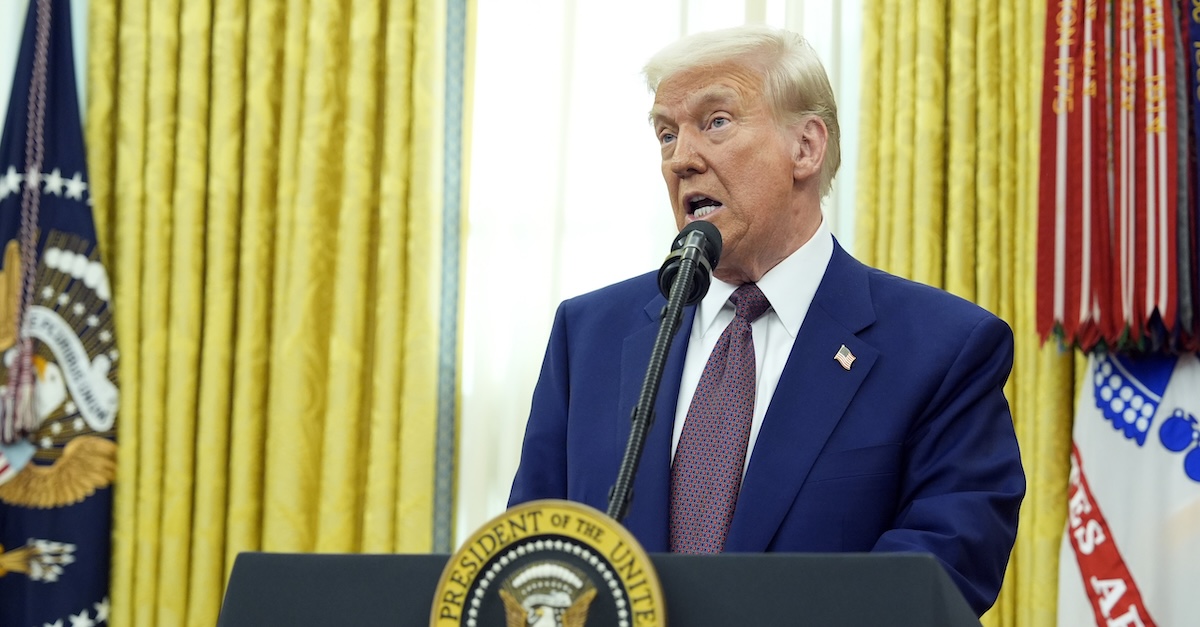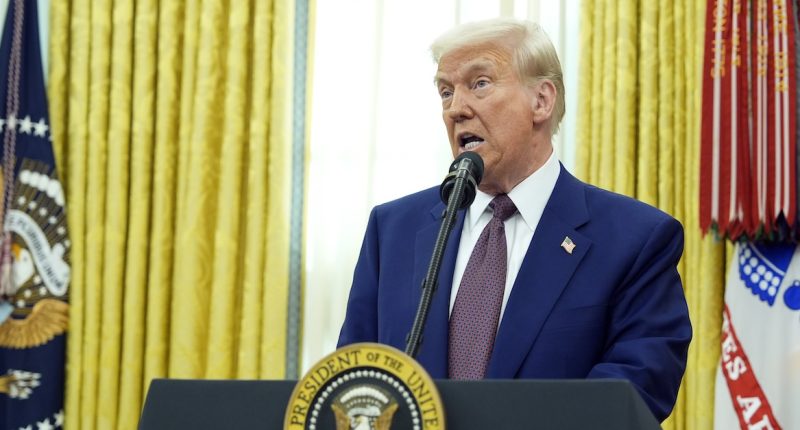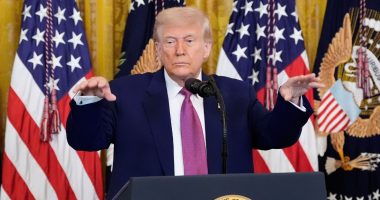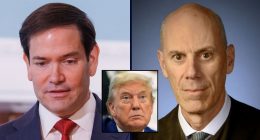
President Donald Trump speaks before Robert F. Kennedy Jr. is sworn in as HHS Secretary in the Oval Office, Thursday, Feb. 13, 2025, in Washington (Photo/Alex Brandon).
Yet another law firm has responded to the Trump administration‘s attacks by filing a First Amendment lawsuit in federal court.
On April 9, President Donald Trump signed an Executive Order titled “Addressing Risks from Susman Godfrey” which accuses the Los Angeles-based law firm of Susman Godfrey LLP of “significant risks, egregious conduct, and conflicts of interest.” The order goes on to say the firm “spearheads efforts to weaponize the American legal system and degrade the quality of American elections.”
The order is in line with a series of similar attempts to curtail the power and access of Big Law in the federal government — or at least such firms whose attorneys have worked for clients the Trump administration deems “detrimental to critical American interests.”
The 66-page complaint filed Friday in federal court in Washington, D.C., called the 45th and 47th president’s order “blatantly unconstitutional” and implored the judiciary to act “with resolve–now” lest “a dangerous and perhaps irreversible precedent will be set.”
“The President is abusing the powers of his office to wield the might of the Executive Branch in retaliation against organizations and people that he dislikes,” the lawsuit read. “Nothing in our Constitution or laws grants a President such power; to the contrary, the specific provisions and overall design of our Constitution were adopted in large measure to ensure that Presidents cannot exercise arbitrary, absolute power in the way that the President seeks to do in these Executive Orders.”
The complaint sharply noted “others like it,” a reference to several recent executive orders signed by Trump targeting disfavored law firms – many of which have also become the subject of harsh litigation.
“Each one of those constitutional violations warrants immediate action to declare the Order unconstitutional, enjoin its implementation, and take all actions necessary to halt and remedy its effects,” the lawsuit continued. “The Order represents a clear and harmful attempt to discourage law firms and their clients from challenging abuses of government power.”
The law firm said the sum amount of Trump’s orders threaten the American system.
“In America we have, in the words of John Adams, a government of laws and not men,” the filing intoned. “President Trump’s campaign of Executive Orders against law firms and others, including the Executive Order he signed on April 9, 2025 against Susman Godfrey, is a grave threat to this foundational premise of our Republic.”
Encompassing 10 counts, the lawsuit alleged five different violations of the First Amendment, four violations of the Fifth Amendment, and that the order was broadly ultra vires – or beyond the president’s power – for “exercising judicial power and because no statute grants such authority.”
The election-focused grievance mentioned in Trump’s executive order was fodder for the plaintiff’s claims in the lawsuit.
“The Executive Order makes no secret of its unconstitutional retaliatory and discriminatory intent to punish Susman Godfrey for its work defending the integrity of the 2020 presidential election,” the lawsuit went on.
The filing continued like this, at length:
The Order’s retaliatory intent is unmistakable. Its stated purpose is to punish Susman Godfrey and its clients for Susman Godfrey lawyers’ constitutionally protected advocacy in matters that President Trump claims are adverse to his personal or political interests—even though none of those representations has ever given rise to any suggestion whatsoever that the Firm’s conduct was anything other than entirely ethical and reflective of the highest standards of the profession.
And this, the law firm says, is prohibited by the First Amendment.
“The Order violates the First Amendment by retaliating against Susman Godfrey for its speech; by discriminating against Susman Godfrey for views or perspectives it or its clients have expressed; by interfering with the right to petition the government; by interfering with the Firm’s associations with its clients; and by placing unconstitutional conditions on the Firm’s exercise of its First Amendment rights,” the lawsuit continues. “The Executive cannot ‘use the power of the State to punish or suppress disfavored expression’ or ‘attempt to coerce private parties in order to’ accomplish those forbidden ends.”
But Trump did not stop at just election-related litigation.
The executive order read:
Susman also funds groups that engage in dangerous efforts to undermine the effectiveness of the United States military through the injection of political and radical ideology, and it supports efforts to discriminate on the basis of race.
Susman itself engages in unlawful discrimination, including discrimination on the basis of race. For example, Susman administers a program where it offers financial awards and employment opportunities only to “students of color.”
Here, the law firm said, Trump simply got the facts wrong.
“Susman does not have any program that offers employment opportunities only to people of color,” the lawsuit read. “The Order on its face thus punishes the Firm for advancing arguments, or using ‘funding’ to support ‘efforts,’ with which the President disagrees.”
And again, the plaintiffs said, this is not allowed under the First Amendment. Here, the law firm specifically says Trump’s chagrin over their race-based efforts amounted to viewpoint discrimination.
Love true crime? Sign up for our newsletter, The Law&Crime Docket, to get the latest real-life crime stories delivered right to your inbox.
The filing seeks a declaratory judgment that the executive order is unconstitutional, a court order directing various agencies to rescind any guidance related to Trump’s directive, as well as an immediate restraining order, a preliminary injunction, and a permanent injunction.
Striking an ominous tone, the lawsuit positioned itself as a canary in a coal mine for the broader legal profession.
“Put simply, this could be any of us,” the filing read.







